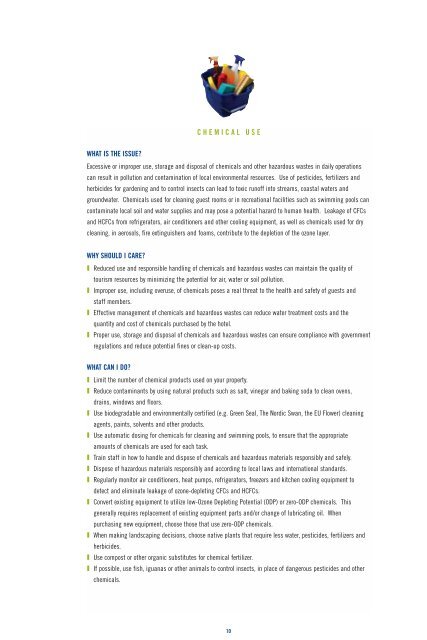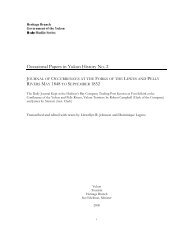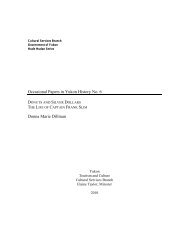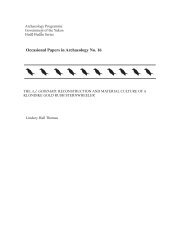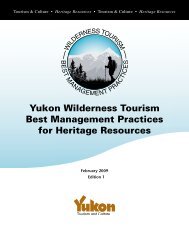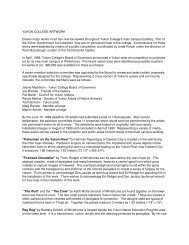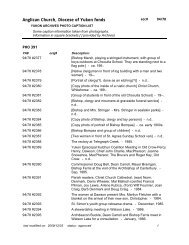a practical guide to good practice a practical guide to good practice
a practical guide to good practice a practical guide to good practice
a practical guide to good practice a practical guide to good practice
Create successful ePaper yourself
Turn your PDF publications into a flip-book with our unique Google optimized e-Paper software.
WHAT IS THE ISSUE?<br />
C H E M I C A L U S E<br />
Excessive or improper use, s<strong>to</strong>rage and disposal of chemicals and other hazardous wastes in daily operations<br />
can result in pollution and contamination of local environmental resources. Use of pesticides, fertilizers and<br />
herbicides for gardening and <strong>to</strong> control insects can lead <strong>to</strong> <strong>to</strong>xic runoff in<strong>to</strong> streams, coastal waters and<br />
groundwater. Chemicals used for cleaning guest rooms or in recreational facilities such as swimming pools can<br />
contaminate local soil and water supplies and may pose a potential hazard <strong>to</strong> human health. Leakage of CFCs<br />
and HCFCs from refrigera<strong>to</strong>rs, air conditioners and other cooling equipment, as well as chemicals used for dry<br />
cleaning, in aerosols, fire extinguishers and foams, contribute <strong>to</strong> the depletion of the ozone layer.<br />
WHY SHOULD I CARE?<br />
I Reduced use and responsible handling of chemicals and hazardous wastes can maintain the quality of<br />
<strong>to</strong>urism resources by minimizing the potential for air, water or soil pollution.<br />
I Improper use, including overuse, of chemicals poses a real threat <strong>to</strong> the health and safety of guests and<br />
staff members.<br />
I Effective management of chemicals and hazardous wastes can reduce water treatment costs and the<br />
quantity and cost of chemicals purchased by the hotel.<br />
I Proper use, s<strong>to</strong>rage and disposal of chemicals and hazardous wastes can ensure compliance with government<br />
regulations and reduce potential fines or clean-up costs.<br />
WHAT CAN I DO?<br />
I Limit the number of chemical products used on your property.<br />
I Reduce contaminants by using natural products such as salt, vinegar and baking soda <strong>to</strong> clean ovens,<br />
drains, windows and floors.<br />
I Use biodegradable and environmentally certified (e.g. Green Seal, The Nordic Swan, the EU Flower) cleaning<br />
agents, paints, solvents and other products.<br />
I Use au<strong>to</strong>matic dosing for chemicals for cleaning and swimming pools, <strong>to</strong> ensure that the appropriate<br />
amounts of chemicals are used for each task.<br />
I Train staff in how <strong>to</strong> handle and dispose of chemicals and hazardous materials responsibly and safely.<br />
I Dispose of hazardous materials responsibly and according <strong>to</strong> local laws and international standards.<br />
I Regularly moni<strong>to</strong>r air conditioners, heat pumps, refrigera<strong>to</strong>rs, freezers and kitchen cooling equipment <strong>to</strong><br />
detect and eliminate leakage of ozone-depleting CFCs and HCFCs.<br />
I Convert existing equipment <strong>to</strong> utilize low-Ozone Depleting Potential (ODP) or zero-ODP chemicals. This<br />
generally requires replacement of existing equipment parts and/or change of lubricating oil. When<br />
purchasing new equipment, choose those that use zero-ODP chemicals.<br />
I When making landscaping decisions, choose native plants that require less water, pesticides, fertilizers and<br />
herbicides.<br />
I Use compost or other organic substitutes for chemical fertilizer.<br />
I If possible, use fish, iguanas or other animals <strong>to</strong> control insects, in place of dangerous pesticides and other<br />
chemicals.<br />
10


